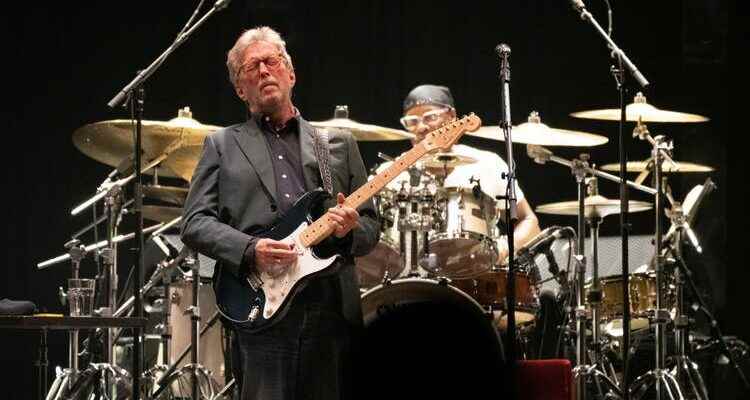The British guitar virtuoso gave the Zurich audience a concert that showed his strengths: his inspired approach to the blues tradition. But there were also weaknesses.
Eric Clapton is like a ventriloquist using his guitar to dialogue.
First just music. And then there was singing. That’s how it is with Eric Clapton. It seems as if noise and sound must first make room, blow the dust of everyday life from the soul, soften its incrustations, knead and heat up emotional matter, before his sad voice can emerge from the depths of his throat.
It was the same in his career. The stubborn boy, who grew up with his grandparents, first discovered the guitar and with it the blues, which gave him stability in a difficult world. Eric Clapton developed something like self-confidence on the guitar, the sheer virtuosity strengthened his backbone, so that he finally dared to stage himself in front of the microphone.
On Friday evening, too, instrumental music has to start again in the almost sold-out Hallenstadion. The eight-piece backing band warms up to the riff of «Tearing Us Apart». Eric Clapton has found himself in the middle: in his grey-green jacket and dark blue shirt, the freshly blow-dried, horn-rimmed glasses wearer looks more like a banker or a seller of high-end stereo systems than a rock musician. This distinguishes him from his freaky colleagues, who are adorned with colorful clothes, long hair, hats, caps, headscarves and amulets.
The others are to blame
The drummer drives everyone on, the bass creates the anchor in the chords, keyboard and organ meanwhile provide bubbling harmonies, which are garnished melodically by Clapton and the second guitarist. The individual parts are closely intertwined, the blues rock machinery seems elastic and inspired. The music is enough for itself – and at some point elicits a bitter lament from the singer: The beloved is gone, it’s her friends’ fault. It’s always the other person’s fault.
The pain of separation and world frustration – this is the theme that dominates the concert as well as the American blues, which Eric Clapton has appropriated like no other Brit. He proves it right away in the first blues classics like “I’m Your Hoochie Coochie Man”. The blues is the sound of victims, it cultivates self-victimization. My baby is gone, I’m all alone, nobody cares about me. . . The fact that the baby probably only got away with a black eye and there are still empty bottles lying around in the bedroom is not mentioned. It’s always the fault of others or the devil himself. Even if you give yourself to drink and drugs – like Clapton once did.
The guitar scolds and comforts
Even at 77, Eric Clapton still looks somehow suffering on stage, lonely and godforsaken. He hardly moves to the changing rhythms. And when he sadly intones his verses in a breathy, hoarse voice, the eyes look beyond the audience into infinity. Sometimes, however, he resembles a ventriloquist; The guitar then proves to be a talking marionette, which seems to raise its own voice and expresses the alter ego of the singer.
The melodic and harmonic material is just as reduced in the blues as the thematic. Meanwhile, Clapton knows how to achieve great effects from a few specifications. He savors the blues scale with somnambulistic certainty. Through over-the-top arpeggios, he spirals himself up into feverish temperatures, where the guitar howls, scolds and protests in fat twang. Then again she suddenly gives courage or comfort like a kind mother or an experienced sister.
Clapton didn’t invent the blues, he imitated and internalized the music of African American idols like Robert Johnson and Muddy Waters. By collecting and cultivating their patterns and clichés, he became, so to speak, a style-defining epigone. Alternating between electric and acoustic instrumentation, he performs a number of cover versions in concert – from “Driftin’ Blues” to the beautifully arranged “Nobody Knows You When Your Down And Out” to the classic “Cross Road Blues”.
Museum music
The individual stamp and the musician’s own character are expressed even better in Clapton’s own compositions. So «River Of Tears» may seem a bit shallow in the sweet swathes of synthesizers. In the guitar solo, Clapton once again convinces less through competence and faithfulness to the original than through more spontaneous sentimentality.
Finally, the concert repertoire is rounded off with some rousing oldies. But what’s the use of all the rhythmic rousing and driving in “Layla”, “I Shot The Sheriff” and “Cocaine” if the audience is crammed between the rows of seats all evening? Partying is different! Eric Clapton¸, who communicates as little with the audience as he does with his band, certainly presents a concise retrospective in the Hallenstadion. But the 90-minute performance seems controlled and documentary: as if the guitarist and his band had been placed directly on the stage from the blues rock archive.
